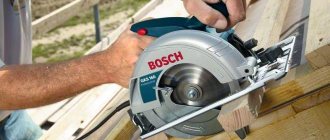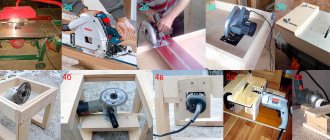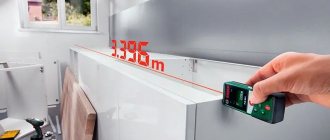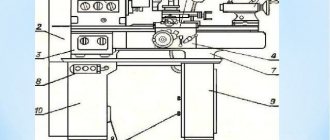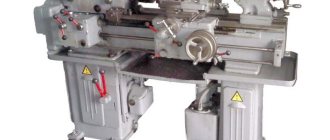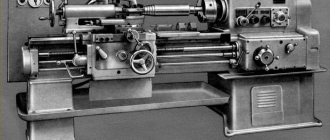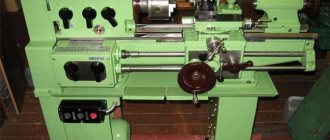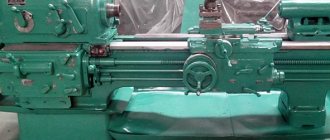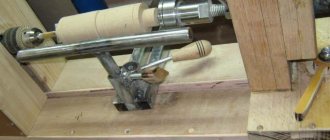A circular saw is a universal carpentry tool designed for cutting any type of wood in a short time. With the support of the master, Andrey Perepelkin, we checked several dozen circular papers. As a result of tests and checking customer reviews, we prepared a rating of the best circular saws of 2021. The TOP includes the most successful and reliable models to date. We considered only hand-held universal circular saws for home use.
Thanks to its special design, the saw can guarantee precise straight cuts at any angle. Traditionally, the best equipment for cutting wood is produced by the Japanese company Makita. Next in terms of reliability are the companies HITACHI, BOSCH, DeWALT, ZUBR, HAMMER. The manufacturer Bosch has a blue tool - this is a professional tool, which means it is made of higher quality and more reliable, the green series is a tool for the home, also of high quality, but the components are simpler.
Technical characteristics of circular saws
When choosing a circular saw for your home, first of all pay attention to the technical characteristics that are given below.
Motor power
Power affects the performance of the tool. The higher this indicator, the thicker the products can be cut using a saw.
If you need to spread the board lengthwise, then the power needed is from 1600 W.
In carpentry, there are 3 classes of circular saws, depending on power:
- Up to 1000 W – lightweight and compact devices designed for cutting plywood or thin boards.
- 1000 – 1500 W – semi-professional saws for use on a small construction site. Suitable for cutting small beams, logs or thick boards. If used at home, such a saw will last longer than a low-power one.
- From 1500 W – a professional tool with a long engine life allows you to work up to 6 hours a day with breaks.
Disc rotation speed
A characteristic that affects the speed of operation. Most often, this indicator directly depends on engine power. When processing hardwood at high speeds, the risk of jamming of the working element due to the resistance of the material is reduced. Semi-professional models have a rotation speed of 5200 - 6000 rpm - this is a good indicator for purchase.
Cutting depth
One of the main criteria for choosing a circular saw is the cutting depth of the material. A characteristic that directly depends on the power and diameter of the cutting disc. When purchasing a household saw, the maximum cutting depth will not exceed 55 mm, and a professional tool will easily cut wood 80 mm or more thick.
- From 40 to 46 mm , which is considered a shallow depth, and a tool that satisfies this parameter is a household one.
- From 50 to 55 mm – the saw is capable of cutting thick floorboards or small bars.
- From 65 to 70 mm – using the tool you can cut non-load-bearing elements of the frame of a wooden house.
- From 65 to 140 mm - a professional saw that can quickly cut small beams or several boards at the same time.
Working at an angle
This characteristic most likely relates to the base of the device rather than to the saw itself. The bed on some hand saws has skids and a locking mechanism to allow you to set the angle of inclination, which is convenient when working with doors, baseboards or furniture.
Which sole (platform) is better?
All experts write that a cast sole is best. But saws with good cast soles are expensive.
The main thing is to look at the quality of the sole, and not at the production method. Even if the sole is forged, but thick and hard, then such a sole is no worse than a cast one.
Circulars costing up to 5,000 rubles generally have flimsy stamped soles.
Saws with a price of 5,000-10,000 rubles are cast or stamped, but thick and hard!
Battery type
Wireless, battery-powered devices allow you to cut wood in any hard-to-reach place. Although it sounds like an advertising slogan, it is truly a useful type of tool. If you deal with sawing work once every six months, then a cordless saw is of no use to you; this category of saws is more suitable for professional use.
There are two main types of batteries for household power tools:
- Lithium-ion (Li-Ion) are modern batteries that do not lose capacity after replenishing energy at any level of residual charge. The downside is low frost resistance - the battery loses efficiency when used in subzero temperatures (this is in theory). In practice, people calmly work with them in both cold and hot weather.
- Nickel-cadmium (Ni-Cd) batteries are obsolete but still widely used. To replenish the capacity, they require complete discharge, but at the same time, they are convenient when working in extreme conditions. It is better not to buy such batteries, and there are not many of them left on the market.
Battery voltage - there are 3 main types on sale - 10.8 V, 12 V, 18 V. As a rule, the higher the voltage created inside the battery, the more powerful the tool. The best batteries on the market are considered to be products from brands such as Metabo and Bosch. Before purchasing a new battery, you need to study what voltage range a particular device is designed for.
Do you need a level or a laser pointer?
This option allows you to accurately adhere to the cutting path when operating the tool, since the beam indicates the direction of movement of the saw. However, the presence of such equipment does not guarantee an ideal result, since its achievement depends on the experience of the master and the steadiness of his hand when working.
Additional functions
Modern power tools are equipped with additional functions that have become available thanks to the development of electronics. Also, different models may have additional capabilities that are made using mechanical devices.
When choosing, you should pay attention to the presence of these functions and know what they give the user. Let's look at the main ones in more detail.
Rotation speed stabilization system
This is an electronic system that, when under load, increases the current supplied to the electric motor. And, conversely, it decreases when working with a light load or without it. As a result, the disk rotates at the same speed under any load.
Tip #6. It should be remembered that the loads are not unlimited (a 1 kW motor cannot produce a power of 2 kW).
Under excessive loads, the speed will still drop or the engine will be switched off by the protective system, if any. However, the system allows for smooth operation of the saw in different modes, which makes work easier.
Soft start system
When starting, most electric motors consume 3 times the rated power. For example, a 2.2 kW motor can consume up to 6.6 kW at startup , putting an excessive load on the network.
Sometimes networks that are not designed for this and are loaded with other consumers cannot handle it. And in any case, during startup, the light “goes down” for a while, which can be seen from the fading light of the incandescent light. The soft start system avoids this.
In addition, it improves safety. If, during startup, the disk accidentally ends up “in the wrong place,” it will not cause harm, since at first it will rotate slowly and there will be time to correct the situation.
This is a useful function, but there is a drawback - the saw does not immediately start working, it takes from 3 to 5 seconds to reach full speed .
Overload protection system
Performs the function indicated in the name itself. If the engine overheats, the disk or gearbox jams, or there is overload, the system will turn off the engine. Its only drawback is that it can be set too “vigilant” and turn off the engine too often due to minor overloads.
Electrodynamic brake
Without such a system, when the saw is turned off, the disk continues to rotate for some time by inertia. The electrodynamic brake, after turning off the rotation, creates a magnetic field in the engine that slows down the rotation almost immediately. This increases safety and convenience when working.
Slip clutch
The function protects the engine mechanically. If the disk jams, when clamped with a certain force, the engine will not burn out, because the drive from the engine to the disk will slip due to the clutch.
Protection against accidental activation
Made in the form of a switch with two buttons. The first button unlocks the main power button. The system increases safety, but creates some inconvenience when turned on.
Pay attention to our selection tips, they will help you make the right choice.
Spindle stop
In order to unscrew the disk clamping washer (remove the disk), you need to fix the spindle (the shaft on which the disk is located). Otherwise, the disk fastening bolt will spin along with the shaft and it will not be possible to unscrew it. On different models, this fixation is performed in two ways:
- The spindle has edges for a wrench.
- A stopper lever is built inside the mechanism, by pushing it in you can lock the spindle.
Tip #7. The option with a built-in stopper is more convenient. But with a wrench it is more reliable, since when the disc fastening bolts are tightly tightened, such stoppers often break off.
Rip fence and guide rail
The rip fence is available with almost all models. It allows you to cut the workpiece into thin slats, but only if at least one side of the workpiece is smooth. The stop is inserted into the saw body, and its platform moves along the flat side of the workpiece, ensuring an accurate cut.
The guide bar is a platform that is placed and secured to the workpiece. The saw moves relative to the guide bar, so it is not necessary to have a straight edge to the workpiece.
Both devices can be useful in certain operations.
The guide allows you to make a very even cut; it is considered especially useful when sawing laminated chipboard.
Spring loaded housing
All models of circular saws are equipped with this function, as it ensures safety. The casing opens slightly as sawing, freeing the passage of the rotating disk through the workpiece. When removing the saw from the workpiece, the spring automatically closes the blade with a protective cover.
Which circular saw to choose for your home or garden?
Purchasing a new circular saw can be a real problem for a beginner, given the large selection, range of prices and product parameters at the retail outlet. When choosing the most suitable tool, you should be guided by the following principles:
- If a tool is constantly needed in a country house or at home to perform standard construction or finishing work, a circular saw with an average power of 1500 W and a cutting depth of at least 55 mm is suitable. If you need to spread the board lengthwise, then the power needed is from 1600 W.
- If thin pine boards, for example, lining, as well as laminate or plywood, are to be cut, then a power of up to 1000 W with a cutting depth of up to 40 - 45 mm will be quite sufficient.
- If you need to make cuts in hard-to-reach places where you need to hold the device suspended, the best solution would be to buy a cordless tool with a small diameter saw blade.
- When it comes to building a wooden house and long-term use, it is better to opt for professional equipment with a power of 1.9 - 2.2 kW.
- If you need to create an opening under the sink or hob in the kitchen countertop, you should use a jigsaw.
- If you need to constantly harvest wood for large construction projects or for sale, you should consider purchasing a stationary circular saw.
The final purchasing decision depends on the type of intended use and the type of activity of the master. If the work involves woodworking, in most cases, only a professional tool is suitable, but for household use 1 – 2 times a month, you should opt for budget, inexpensive models.
How to choose a saw blade
There are two types of saw blades.
1. Monolithic saw blades
This saw blade is made from solid metal. Although it wears out quickly, it can be sharpened.
2. Carbide saw blades
When making a disk, the teeth are soldered with hard alloys. This saw element is strong and durable, making it difficult to resharpen.
Discs come with teeth of different shapes and with different arrangement of teeth. This must be taken into account when choosing a saw element. For example, to make a neat cut, the blade must have trapezoidal teeth, and variable teeth will ensure high-quality cutting along the grain.
The number of teeth affects the quality and speed of cutting. The cut will be neat if the saw element has many teeth, but the cutting process will take longer than with a small number of teeth.
When choosing a blade, it is important not to make a mistake with the internal seat size, since it differs for different saw models.
Ideally, to be able to work with different lumber, you need to stock up on different types of discs.
More information about choosing saw blades:
Features of choosing a saw blade for a circular saw
Author: Victor Prokhorov
The best corded circular saws
Circular saws are very popular among consumers, and people often share positive and negative reviews with each other. As a rule, the quality of the product greatly depends on the brand under which the power tool is manufactured. The best models are presented below in descending order.
Classic circular saws with a cable for connecting to the network are widely used in construction and repair.
1
Makita 5008MG, 1800 W
Rating:5.0
- Power: 1800 W
- Disc diameter: 210 mm
- Rotation speed: 5200 rpm
- Functions: backlight
- Weight: 5.1 kg
Average price: RUB 12,987
The first place in the ranking goes to a manual circular saw for the home from Japan. Molded sole. The saw operates from a standard AC mains voltage of 220 V.
The powerful device produces a rotation speed of a disk with a diameter of 210 mm up to 5200 rpm with a cutting depth of up to 75 mm.
The bed can provide bevel cuts in 3 positions - 90, 45 and 22.5 degrees, as well as cutting depth, thanks to the ability to adjust in 2 directions.
The built-in dust collector will keep the work area clean.
The ergonomic rubberized handle fits well in the hand, allowing you to work for a long time, and a bright light will help illuminate the cutting line to improve cutting accuracy.
The working body of the saw is covered with a folding steel casing, guaranteeing safety during operation. The casing does not jam or cling.
When changing the disk, the spindle is securely locked, which reduces the risk of injury.
There is nothing superfluous in the saw.
2
BOSCH GKS 190, 1400 W
Rating:4.9
- Power: 1400 W
- Disc diameter: 190 mm
- Rotation speed: 5500 rpm
- Functions: engine braking
- Weight: 4.2 kg
Average price: RUB 9,137
Second place goes to a hand-held circular saw from Germany, whose engine can reach a speed of 5500 rpm.
The device is capable of cutting through a layer of wood up to 70 mm thick at a right angle and 50 mm at a 45-degree inclination. The disc size is 190 mm with a mounting hole size of 30 mm.
The saw weighs only 4.2 kg, which allows it to be used not only on horizontal, but also on vertical surfaces, as well as in hard-to-reach places.
The device has a built-in dust collection option, as well as automatic blowing away of sawdust that interferes with work.
The circular saw is equipped with a convenient steel stand with markings that help you set the exact position of the cutting line for any type of wood.
The disc replacement process occurs while the spindle is locked, which guarantees complete safety.
3
DeWALT DWE560B, 1350 W
Rating:4.8
- Power: 1350 W
- Disc diameter: 184 mm
- Rotation speed: 5500 rpm
- Functions: vacuum cleaner connection
- Weight: 3.7 kg
Design and operating principle
The basic principle of operation of circulars is extremely simple. The engine rotates a shaft on which a disk with cutting teeth is fixed. The disk rotates, the teeth cut the material.
The device of a circular circular saw of the classic manual type with a disk for cutting wood.
But the device as a whole, the bed, the feed system, the ability to adjust the rotation speed, tilt angles, engine power, and the diameter of the cutting disk on different circular saws differ very significantly. From the simplest devices (table, motor, shaft, belt, disk) to modern and complex ones that allow you to cut wood of different sizes and lengths, at different angles, and different geometries.
Content:
- 1. Types of circular saws
- 2. Main technical characteristics
- 3. Additional features
- 4. Popular models and manufacturers
Making a choice is always difficult. Especially when you need to choose not from two options, but from hundreds. This is when serious difficulties begin, because it is not clear how similar circular saws differ and why they have such a difference in price.
What happens if you approach the issue of choosing a circular saw carelessly, without understanding the types and parameters? In the best case, you will purchase an expensive model for professional use, and you will use it occasionally. And you will end up overpaying significantly for design features and additional functions that you don’t need. It will be worse if the tool you choose will be used much more intensively than it can withstand. One day the saw will break while working on wood that is too hard, or from being used continuously, or from pressing too hard. Why? Because all the conditions of the upcoming work were not taken into account in advance and, accordingly, the model was chosen incorrectly. You don't want to get into such a situation, do you? Then it’s still better to read the article first and then make a choice. Let's start with what types of saws there are.
FAQ
Which circular saw manufacturers are the best?
+
Today there are many companies that produce fairly good and high-quality tools. The most popular and already proven manufacturers are Makita, Bosch, Skil and DeWalt.
How much does a circular saw cost?
+
The cost of a saw depends on its manufacturer and functionality. The average price for a household tool is about 7,000 rubles. But for 5 thousand you can buy a pretty decent tool, just without additional functions. High-quality devices from well-known manufacturers are offered in the price range of 12-17 thousand rubles. Professional-level equipment starts from 20-25 thousand.
Basic tool parameters
Circular devices can be divided by power. The more powerful the electric motor, the higher the stability and quality of the cut. As power increases, the weight and size of the saw increases. The cost of equipment also depends on this indicator. Therefore, when choosing a tool, you first need to determine the range of tasks that it should solve. Today saws are divided into:
- Household ones, which are used for occasional simple work around the house or on a summer cottage. Characterized by motor power up to 800 W.
- Universal. They live up to their name by being able to perform a wide range of tasks. Universal models can perform complex work, and they are used even in industry. The motor has a power of 800 to 1200 W.
- Professional equipment. They have a motor with a power of 1200 W. This is a very large tool and requires work skills and a certain amount of skill. It is used in serious industries and is practically not used in everyday life.
